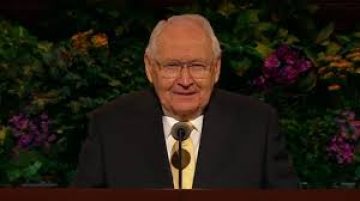“We’ve demonstrated that women can do what men do, but not yet that men can do what women do. That’s why most women have two jobs—one inside the home and one outside it—which is impossible. The truth is that women can’t be equal outside the home until men are equal in it.” –Gloria Steinem, 2009.
Occasionally the gendered language of the church is more hurtful towards men than it is towards women. We hear it when women are spoken of as naturally more righteous or when men are said to lack self-control. The gendered culture of Mormonism is so strong that most of these messages, for most Latter-day Saints, go unobserved or unchallenged. It’s the landscape we live with every day. But it is damaging for everyone.
In the Saturday afternoon session of General Conference Elder L. Tom Perry said this in his (mostly good) talk about the crucial need for good parenting:
Let us first look at the role of the mother. Listen to a quote from President Gordon B. Hinkley, ‘Women who make the house a home make a far greater contribution to society than those who command large armies or stand at the head of impressive corporations. Who can put a price tag on the influence on her mother? Particularly that influence that she has on her children, her grandmother on her posterity, or aunts and sisters on their extended family.
We cannot begin to measure or calculate the influence of women who, in their own way, build stable family life and nurture, for the everlasting good, the generations of the future. The decisions made by women of this generation will be eternal in their consequences. May I suggest that the mothers of today have no greater opportunity and no more serious challenge than to do all they can to strengthen the home.’
Now let’s look at the role the father plays in our lives. Fathers give blessings and perform sacred ordinances for their children. These become spiritual highlights in their lives. Fathers are personally involved in leading the family in prayer, daily scripture study, and weekly home evenings. Fathers build family traditions by being involved in vacation trips and outings that will involve family members. Memories of these special times with together will never be forgotten by their children. Fathers hold one-one-one visits with their children and teach them gospel principles. Fathers teach sons and daughters the value of work and help them understand worthy goals in their lives. Fathers set an example of faithful gospel service. Please remember brethren, your sacred calling as a father in Israel, your most important calling in time and eternity, a calling from which you are never released.
My husband, Patrick, who is the calmest, gentlest person I have ever met, shook his head in annoyance. He is righteous man who is extraordinary to me in his ability to give everyone the benefit of the doubt and be patient with differences in opinions or beliefs. “This is horrible,” he said quietly. “It’s like I’m a visiting high counselor.”
Beyond the potential for inducing guilt, I don’t have a problem with what Elder Perry said about mothers and women, except that it’s equally true of fathers and men. Both Patrick and I have made sacrifices in our careers to place our family as the clear priority in our lives. Patrick is better at playing with our kids than I am and he’s often more patient with them. As Elder Perry (sort of) said, one cannot begin to measure or calculate the influence of how he is building our family life and nurturing generations of the future.
But this glorifying language of motherhood was not matched in Elder Perry’s description of fathers, which focused mostly on events, not on the day-to-day hourly grittiness of an involved parent. Fathers are there for the spiritual highlights, the fun weekend activities, the memorable vacations. By his description fatherhood does not sound an immersive, life-altering experience. It sounds like a very important job.
However, Elder Perry’s description of fatherhood sounds really close to my grandparents’ experience and their ideas about parental roles. It even sounds a little bit like my parents’ experience. But my generation (I’m in my early 30s) is entering parenthood with the assumption that men can and should be richly involved in the grittiness, and not just “visit” their children’s lives. This shift seems to have universally, if not equally, affected all the young fathers I know, Mormon or not. Even the most orthodox young families in my ward have fathers that play a vastly different role than the one their grandfathers adopted. While there’s plenty of room for growth, these are men who know their way around a diaper bag. And they’re proud of it.
I can’t help but think that when these men become leaders in the Church, they will not speak of motherhood and fatherhood as being so very different. Having immersed themselves in parenthood to a greater degree than perhaps any previous generation, they will be sensitive to both the potential dangers of venerating and the offensiveness of side-lining one half of the parenting partnership. The way parenting challenged and changed them will improve the Church. As Gloria Steinem indicated, men doing traditional women’s work will fundamentally alter the landscape.







14 Responses
I love this post, and your optimism that future church leaders will not see motherhood and fatherhood as so different.
I notice in the quote that while motherhood is greatly lauded, the speakers don’t seem to know what it entails. That part is quite vague. But fatherhood is described with a very detailed list (which, for all its detail, excludes most of the nitty gritty work today’s fathers do, as your husband noted.)
Thanks April, you make a great point. Possibly the difference is because of two different speakers (the motherhood description is entirely a quote from GBH) but I think it’s more likely that a) the work that mostly comprises motherhood doesn’t really jive with the lovely language being used and b) if you haven’t been deeply involved, it could be difficult to name what those women really do all day.
Great points, MargaretOH.
“I can’t help but think that when these men become leaders in the Church, they will not speak of motherhood and fatherhood as being so very different. Having immersed themselves in parenthood to a greater degree than perhaps any previous generation, they will be sensitive to both the potential dangers of venerating and the offensiveness of side-lining one half of the parenting partnership.”
I agree. The men I know are immersed in daily care-taking duties, and that is how they primarily see their role of fatherhood. I don’t know any that think of fatherhood primarily in terms of blessings and FHE leadership.
Great points, Margaret.
“But my generation (I’m in my early 30s) is entering parenthood with the assumption that men can and should be richly involved in the grittiness, and not just “visit” their children’s lives.”
I really like how you phrase this. As a father, it’s definitely my goal to not be a visitor in my children’s lives. I wish this view of parenting could filter up more quickly than simple aging and replacement of the Q15 will move it. 🙂
Thanks Ziff. I hope it filters up a little faster too and I have some hope for it. I have several men I know from the next generation up (my sister’s father-in-law, etc.) who have told me that they watch their sons being really active, involved parents, and have some regret that they didn’t play that role. Some grandfathers I know have more diaper-changing, tantrum-soothing, book-reading and carpool- driving experience with their grandchildren then they did with their own children and they love that they’re finally getting to do it. So maybe that generation will start the revolution.
Beautifully put, Margaret. This makes me feel very hopeful for the future of the church – and for all of us. I agree with you and Gloria, “men doing traditional women’s work will fundamentally alter the landscape” and I’m seeing that everywhere. Thanks for this post. I like your husband’s input too. You sound like a great team.
I wholeheartedly agree with you that the gendered culture of Mormonism hurts everyone. I feel things are changing, though, and will continue to change in the ways you describe.
Great insights. As you said, it is a matter of difference in generation and everything that this shapes. Elder Perry belongs to another generation who understood the roles inside and outside the home very differently. I am also an optimistic, like you, that this kind of language and conceptualization of fathers vs mothers will go away with this generation of leaders of the church. They are authority in the church but they also represent the historical, economic and social context on which they grew up. They may use Ipads and Iphones but that is where their adaptation to the new times ends as well.
Yes, having some cultural understanding can go a long way for having compassion for and patience with these men. Stepping out of one’s own cultural assumptions is so hard for anybody. As my husband said at the end of the talk, “Well, I think we just got a really good insight into what Elder Perry’s household was like.” Sometimes these talks tell us more about the speaker than anything else.
Thanks for the post. Two experiences came to mind from my ward:
First, a few weeks ago, I lugged my (two year old) son’s bag into priesthood with me. A ward leader not much older than me (and with small children of his own) asked about the large bag. I explained that my son is newly out of diapers, so among other things I packed a change of clothes for him. But why, he wondered, wasn’t the bag with him (in nursery)? It occurred to me that as the father he had never taken primary responsibility for his children at church. He seemed to have no idea that, if something went wrong with potty training, nursery leaders would seek out a parent to address the situation. That was astounding to me.
On the other hand, we have a bishop (old enough to be my father) who has more of this new vision. He has specifically visited the Elders Quorum to talk with them about being more engaged fathers, that there’s no reason they can’t change just as many diapers as their wives. (Why is this always the go-to involved-father metaphor?) And he’s commended me on my own involvement with our son. So change is generational, but also (thankfully) sometimes unevenly faster than that.
As a nursery leader, this also makes me wonder why the nursery leaders had never brought children to this father for a change. Sometimes we bring the child to RS to deliver him or her to Mom, but sometimes we bring the child to Elders Quorum for Dad. In your ward, are nursery leaders more likely to interrupt RS than Elders Quorum?
I think our nursery leaders do a pretty good job taking their cue from parents (we trade days whenever possible). When I’m hauling around the bag I try to let them know where I’ll be. But that’s not usually EQ (and never RS) so I couldn’t say for sure which group is interrupted more often.
I wonder if the thing with nursery leaders typically seeking out the mom for help (which seems to continue to be the general practice) is another example of the phenomenon of people acting more traditional in formal roles than informal ones at church. I’ve noticed for a long time that people who are willing to voice doubts or disagreements about doctrinal issues in informal conversations (even with a large group of people) will revert to traditional comments or lessons in class. I’ve found myself doing it. I bet that the same person who has a generally egalitarian parenting partnership will, without thinking, take toddlers to their mamas simply because of the auto-pilot kicks in when we’re acting in formal church roles.
What I found most troubling about Elder Perry’s conference address was that my husband and I BOTH do every one of the things in the “Father’s List”, either alone when one of us is unavailable, or in full partnership when we are both available (ordinances and blessings are separate topics worthy of discussion). Why do some church leaders work so hard to differentiate gender roles and responsibilities within the family, rather than emphasizing partnership? And why are they so determined to assign “leadership” only to fathers? I am a co-leader, co-president in my home, and I work in partnership with my husband as well as my very capable children.